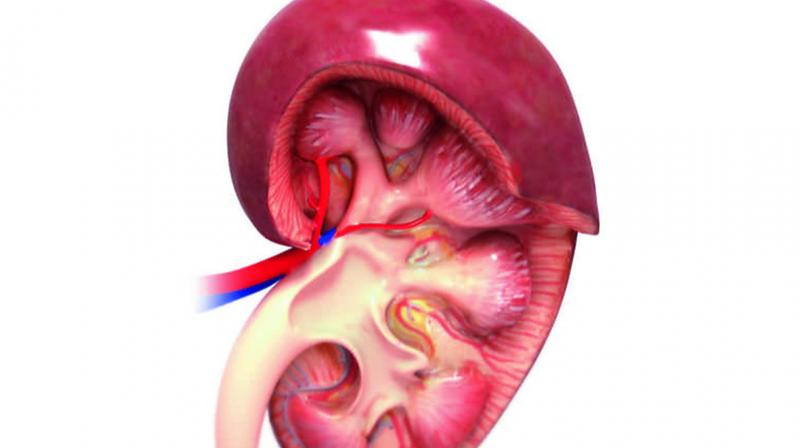Women, beware of CKD!

Dr Naveen M. Nayak, consultant nephrologist and surgeon
Kidney disease has become common these days. The risk factors for kidney disease in women are diabetes mellitus and hypertension but there are other reasons like pregnancy and childbirth-related kidney diseases, renal artery stenosis, urinary tract infections that also cause kidney diseases. Women coming to medical centres for kidney problems are less as compared to men. Dr Naveen M. Nayak, consultant nephrologist and surgeon at Apollo Hospitals explains how hormonal imbalance, lower salt and protein imbalance increases the prevalence of chronic kidney disease in women and is found largely in elderly women.
Q. What is the role of obesity in kidney disease?
Obesity, in addition to contributing to the development of diabetes and hypertension, can independently cause kidney disease and end-stage renal disease.
Q. Can kidney disease be reversed if identified at an early stages? What are the early stage symptoms in women?
Most women can live a largely normal life if diagnosed correctly and at an early stage or at least prevented from progressing to end-stage disease requiring transplant or dialysis. Early symptoms are — leg or face swelling, high BP and fatigue. A very common symptom that is overlooked by many women is irregular menstruation. Women may experience irregular periods for a large number of reasons. This is why this symptom is so commonly ignored. When a woman has CKD, her body starts to retain a higher level of waste products, due to the failing kidneys, causing egg production to be affected, which in turn affects her menstrual cycle.
Q. Can a basic health package help to identify kidney problems?
We only need to look at three factors to detect latent kidney problems.
1. Check blood pressure
2. Urine analysis
3. Serum creatinine measurement — if the filtration in the kidney is deficient and creatinine blood levels rise.
Q. What are the causes that set the alarm bells ringing?
The warning signs are family history of kidney disease, hypertension at a relatively younger age, leg swelling and urinary abnormalities. Changes in sexuality can also be a common kidney disease symptom in women. Like irregular menstrual cycles, other changes in sexuality can also be caused by numerous factors, though over half of the women with CKD have a decrease in sexuality. If a woman experiences an abnormal decrease in sexuality, she should definitely speak to her healthcare professional about being checked for CKD.
Q. How can a person with early onset of kidney disease prevent it from progressing into chronic kidney disease? What are the easiest means and measures that one must adopt?
Once kidney disease is identified, strict control of diabetes, strict control of BP, restoration of dietary salt and protein intake as well as achieving ideal weight with the right lifestyle will definitely stop the progression of kidney disease. This must be done under the guidance of an experienced physician.
Q. How many women in India suffer from chronic kidney disease and end-stage renal failure in 2018? What are the estimates for 2050?
In India, about 100,000 women are detected with CKD and are going through dialysis. By 2050, the numbers are bound to be large in view of increasing prevalence of diabetes and other lifestyle diseases. Usually, women have a shorter urinary tract passage and are commonly prone to urinary tract infection. The damage is higher in younger girls who get UTIs. Once a woman begins dialysis, her periods may even stop altogether. As kidney function drops below 20 per cent of normal, a woman is less likely to conceive because dialysis doesn’t perform all of the tasks of the kidneys.
Q. Are women open to seeking help or do they postpone it?
Around the world and more so in India, the number of male patients receiving dialysis or transplant is significantly higher than women. Women tend to serve more often as kidney donors. The reasons for this inequality are mainly because of the socio-economic, educational and societal perception of gender rates.
Guidelines for healthy kidneys:
1. One has to increase their fluid intake to pass at least two liters of urine per day.
2. There’s no evidence on the difference between intake of tap water or a specific brand of mineral water in preventing kidney stones.
3. People prone to kidney stones should avoid taking aerated drinks to lower the risk of stone recurrence.
4. Patients should maintain normal diets.
5. Reduce your salt intake.
6. Do not smoke as it slows the flow of blood to the kidneys and also increases the risk of kidney cancer by about 50 per cent.
7. Keep blood sugar levels under control since diabetics are more prone to kidney damage.
8. Keep your weight under control as it prevents other complications such as cardiovascular disease and conditions associated with CKD.
9. Keep fit and healthy as it helps reduce blood pressure and keeps the kidney healthy.
10. Get your kidney function checked if you have high risk factors.
Turmeric for kidney health
Turmeric is beneficial in relieving symptoms and improving kidney health. In CKD, turmeric works in a multifold fashion wherein it blunts the effects of the inflammatory molecules and enzymes that lead to kidney diseases. Studies also suggest that turmeric acts as a powerful weapon against CKD by reducing inflammation that plays a vital role in kidney malfunction.
The fact of the matter
1) By 2025, obesity will affect 18 per cent of men and over 21 per cent of women worldwide. There is a clear need for higher awareness, timely diagnosis and proper follow up of CKD in pregnancy.
2) In turn, pregnancy may be also a valuable occasion for early diagnosis of CKD, allowing the planning of therapeutic interventions. Some kidney diseases, such as lupus nephropathy or kidney infection (acute or chronic) typically affect women.
3) Chronic Pyelonephritis is also a potentially severe infection that involves one or both kidneys.

